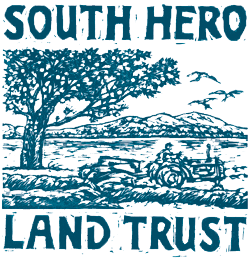Meet a Farmer: Alisha Utter and Kyle Bowley of Arbor Farmstead
Come summertime, Alisha can often be found at local farmers’ markets serving snowcones sweetened using homegrown berries and fruits, made with hand-cranked ice-shaving machine.
Guy Maguire
November 2020
Driving through Grand Isle this fall, my wife and I stopped by Arbor Farmstead’s new farmstand. We didn’t expect to see anyone at the on-your-honor stand, but were pleasantly surprised to find farmer Alisha Utter stocking the shelves as we pulled in. As usual these days, we stood masked and six feet apart. Alisha happily showed us the great products they have to offer, from their farm and others in the area. We picked up some Arbor Farmstead veggies, pickled onions from Pitchfork Farm in Burlington, and mushrooms from FunJ Shrooming Company in St. Albans.
I followed up with Alisha and her husband Kyle Bowley over email, and they kindly shared more about getting started in farming; how they fell in love with the people and soils of the Islands; and eventually decided to settle down in Grand Isle.
Alisha has been fascinated by the food system for as long as she can remember. Though she grew up in upstate New York, it was not until college studies and subsequent work in marine science in California that she began to consider a land-based livelihood. Connecting with charismatic members of the San Diego fishing community inspired her to get her hands dirty farming.
She enrolled in the University of Vermont Farmer Training Program in 2014, the same year she met Kyle. Kyle is a farmer by association and a woodworker by choice. His love for woodcraft was inspired by his late grandfather, a talented hobbyist woodworker. He takes pride in using local wood as a slate for drawing on his generational knowledge and background in mechanical engineering to create one-of-a-kind pieces.
Kyle applying 12,000 volts of electricity to create a Lichtenberg figure etching on one of his cutting boards, made of hard maple from Vermont.
While in the Farmer Training Program, Alisha rented an apartment in South Hero and responded to a "help wanted" ad from Allenholm Farm. Pam and Ray Allen became employers, mentors, and dear friends. After completing the Training Program, Alisha began farming annual vegetables under "Utterly Fresh Produce" on land leased from Allenholm Farm.
She and Kyle began dreaming of a place to call home and start their own farm. However, securing long-term land access proved to be a challenge. While the Islands have great access to markets, longer growing season, and supportive community, land is expensive here. But eventually they were able to buy and begin stewarding seven acres in Grand Isle.
There were other challenges in store. They were building a farm rooted in perennial fruits, which take several years to produce a harvest. In the meantime, Alisha and Kyle patchworked together several off-farm jobs to cover their expenses. But they continued to build their dream, one step at a time. They worked with Carissa Stein from NRCS, who helped them navigate funding opportunities for beginning farmers, and offset the costs of new infrastructure like high tunnels. They continued to stay in touch with their farming mentors Pam and Ray Allen, as well as Nancy and John Hayden of the Farm Between in Jeffersonville.
Alisha and Kyle draw on a veganic stewardship approach, which minimizes reliance on off-farm inputs (like fertilizers) and excludes farmed animal inputs (like manure). Though they offer sanctuary to chickens, ducks, and rabbits in their on-site "retirement home", they do not use the manure produced in their production areas. Instead, they rely on strategies that strengthen naturally occurring on-farm biodiversity.
While they prescribe to a veganic philosophy, Alisha emphasizes, "We appreciate the diversity of approaches across Vermont's working lands and are grateful to be part of the Islands farming community. The support of local farmers has been pivotal in our growth as individuals and as a business”
Alisha and Kyle grow a large diversity of perennial berries and fruits, including these elderberries, which are used in syrups and other products.
This past year has brought growth and change for Alisha and Kyle. They were married, with their ceremony officiated by Ray and Pam Allen! And they’ve adapted and grown the farm to meet local demand. They built the new farmstand, added a full-season CSA, and during the early days of COVID-19 created their “Community Basket” program, which allowed community members to donate local produce to families in need. As Alisha puts it, “keeping our businesses small-scale and deeply embedded in the community has allowed us to adapt quickly to the needs of our neighbors and ultimately remain viable through the challenges inherent to farming and unforeseen circumstances, such as pandemics!”
Recently, Alisha worked with South Hero Land Trust to set up the new Northwest Vermont Grown Growers listserv, an online forum where farmers can share ideas, tools, resources, ask questions, and more. Only a few months old, the listserve is already proving to be a useful resource for farmers, and they encourage other farmers to join as well!
The farmstand is closed for the season, but you can learn more about Arbor Farmstead and browse their online holiday farm store by visiting arborfarmstead.com or in the Northwest Vermont Grown Guide to Agriculture at www.northwestvermontgrown.com.



